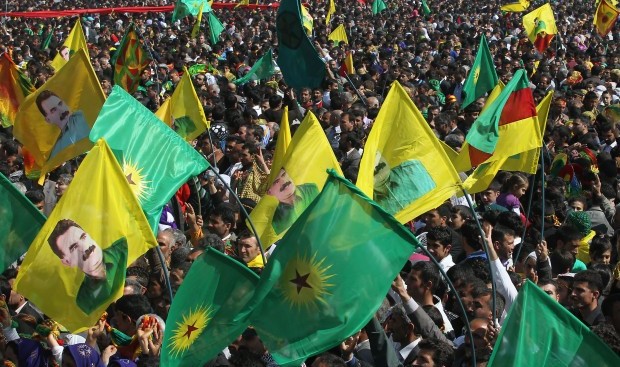
Some thousands of supporters demonstrate waving various PKK flags and posters of jailed Kurdish rebel leader Abdullah Ocalan, in southeastern Turkish city of Diyarbakir, Turkey, Thursday, March 21, 2013, as Ocalan called Thursday for an immediate cease-fire and for thousands of his fighters to withdraw from Turkish territory. (AP Photo)
London, Asharq Al-Awsat—Turkish-Kurdish relations entered a new phase today after Kurdistan Workers’ Party (PKK) leader, Abdullah Öcalan, issued a historic ceasefire call.
In a letter written from his prison cell on the island of Imrali, Öcalan announced that “we have reached the point where weapons should be silent and ideas and politics should speak.”
He emphasized that “a new phase in our struggle is beginning. Now a door is opening to a phase where we are moving from armed resistance to an era of democratic political struggle.”
Öcalan added “Now it is time for our armed units to move across the border [to northern Iraq]. This is not an end but a new beginning. This is not abandoning the struggle, but a start to a different struggle.”
The letter was read out in Diyarbakir in both Kurdish and Turkish in front of a huge crowd of PKK supporters by Sirri Sureyya Onder, a member of the pro-Kurdish Peace and Democracy Party (BDP).
The agreement includes an immediate halt in hostilities between the Kurds and the Turkish military, as well as the withdrawal of an estimated 4,000 Kurdish fighters from Turkish territory to northern Iraq.
Asked whether all PKK leaders are on board with the prospective ceasefire, Nicholas Birch, a former stringer for The Wall Street Journal and The Times of London, told Asharq Al-Awsat that “there’s a general realization on both sides that war is not an option anymore. So in that sense yes, all levels of PKK hierarchy are pointing in that direction.”
However Birch, who is a specialist in Turkish affairs, also emphasized that “at the same time, Murat Karayilan [acting leader of the PKK] has over the last ten days made a couple of statements in which he said that they are following in the footsteps of Öcalan. However, he expressed some concerns that Öcalan is conceding too much too soon.”
Regarding potential changes to the Turkish constitution as a consequence of this ceasefire agreement, Birch said: “If you look at the timing of this process, there is a cynical view in Turkey which emphasizes the link between this agreement and Erdogan’s desire to shift to a presidential system.”
He explained that Erdogan believes he will be backed in this move by Kurdish MPs, adding “Öcalan himself appears to be backing Erdogan’s ambitions; or at least giving the green light.”
Öcalan’s statement coincided with the spring festival of Newroz, the Kurdish celebration of the New Year. An estimated quarter of a million Kurds gathered in Diyarbakir to hear the PKK leader’s message.
In the run up to this announcement, Öcalan had called for prisoners to be released by both sides. The PKK freed eight Turkish soldiers and officials it had held captive in northern Iraq for approximately two years.
PKK leader Abdullah Öcalan has been in Turkish custody since being captured in Kenya in 1999. His organization launched its armed struggle against Ankara in 1984 and is regarded as a terrorist organization by Turkey, the US, and the EU.
The Kurdish issue has been a prime cause for concern for every Turkish government since the foundation of the republic in 1923. This became even more complicated in the mid-1980s when Öcalan’s PKK launched an armed struggle against the Turkish state. This is a conflict that has cost Ankara more than USD 400 billion, not to mention a death toll of more than 40,000 on both sides. However this conflict may finally be drawing to a close in light of the PKK leader’s unprecedented statement on Thursday.
